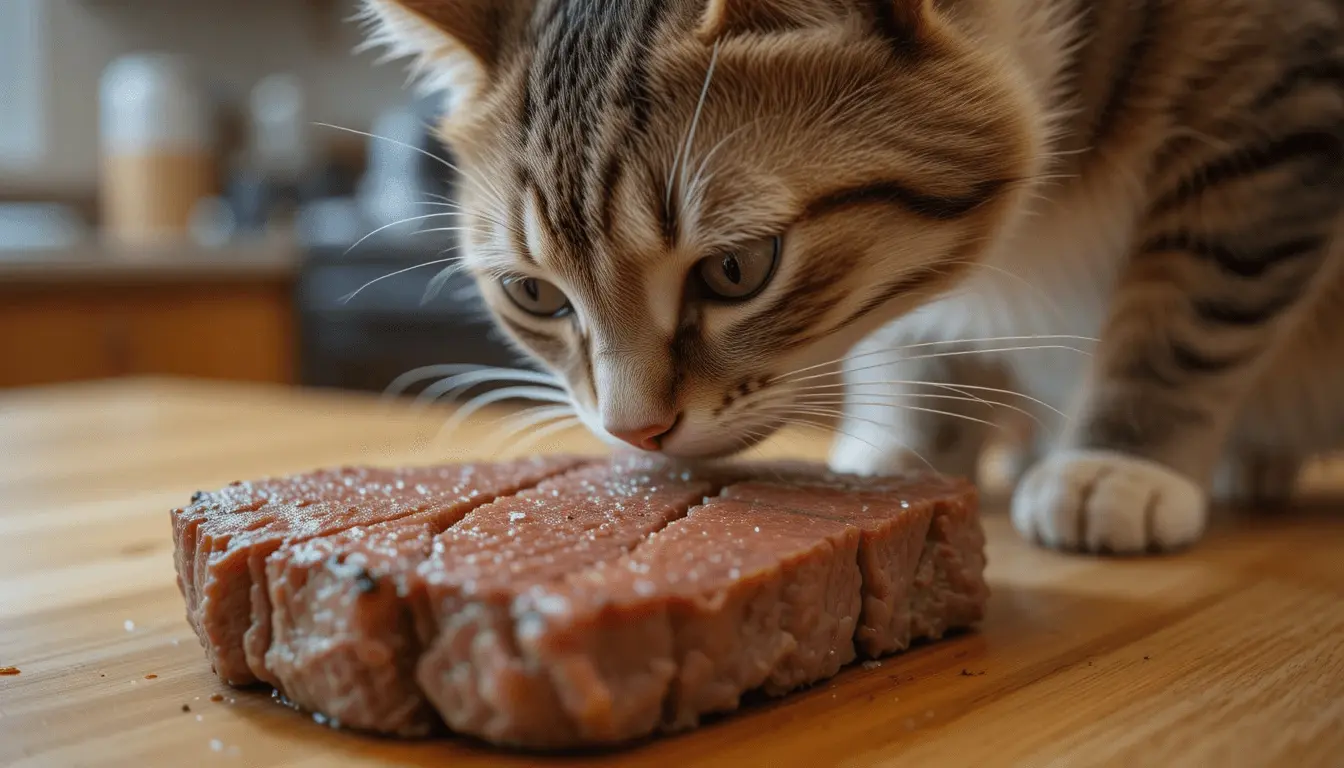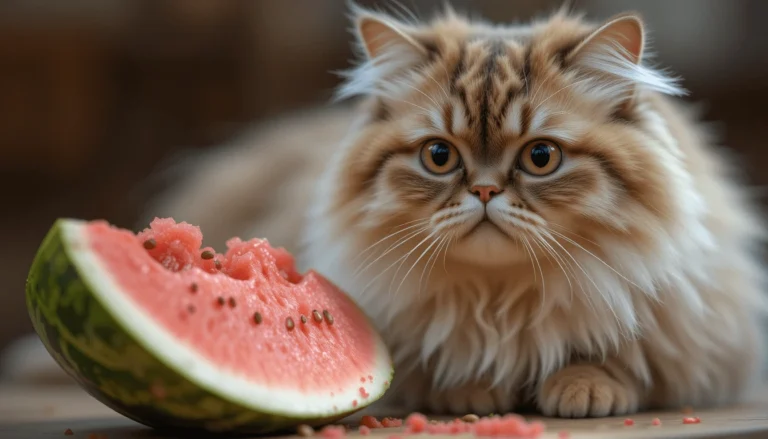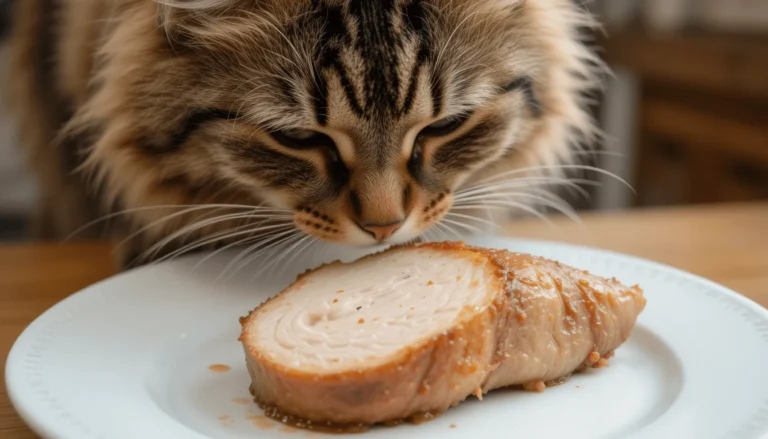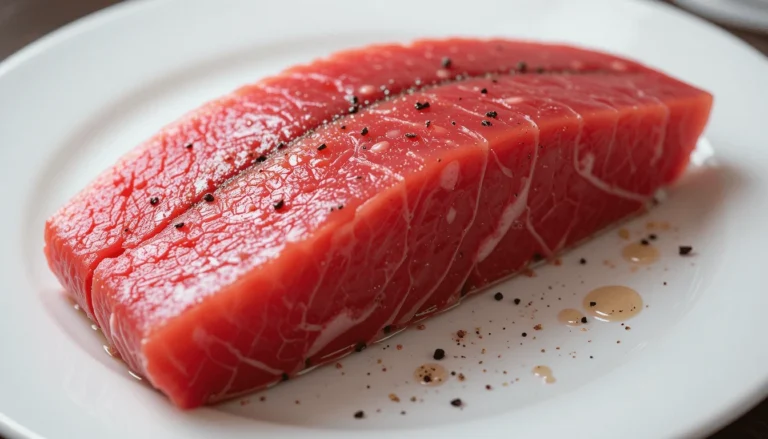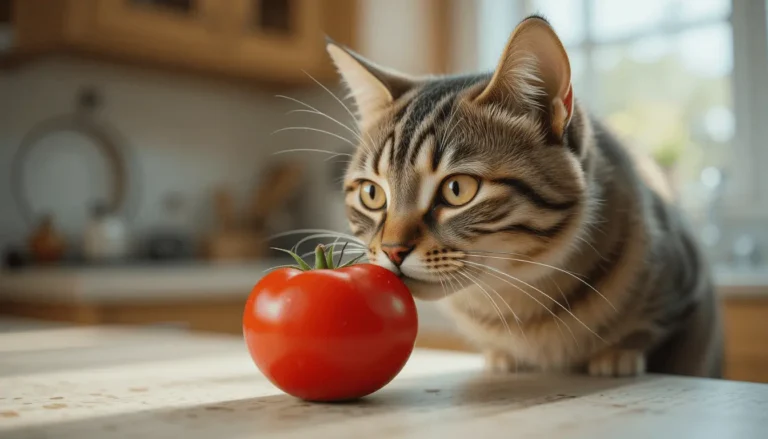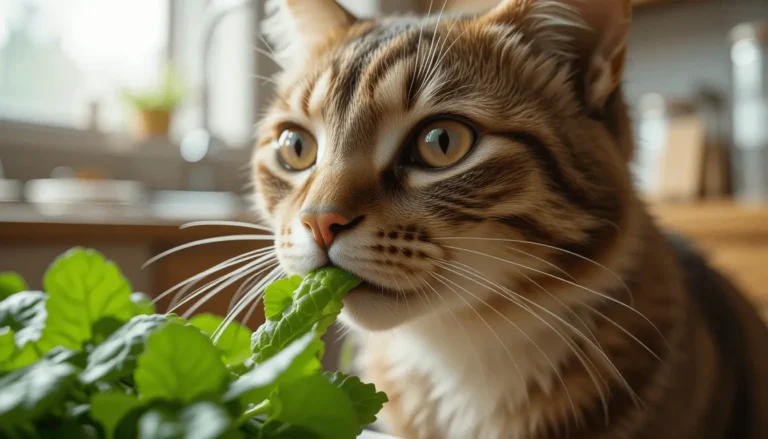Can Cats Eat steak? Risks, Toxicity, and Safe Alternatives
Introduction
As you sit down to enjoy a juicy steak, your feline companion stares at you with pleading eyes. You wonder—can cats eat steak, or is it harmful? While cats are obligate carnivores, not all human foods are safe for them. In this guide, we’ll explore whether steak is a healthy treat or a hidden danger for your curious kitty
Is Steak Safe for Cats? The Basics
Your feline friend stares longingly at your plate as you cut into a juicy steak. Can cats eat steak? The short answer is: Yes, but with major precautions. While cats are obligate carnivores biologically designed to eat meat, the steak we humans enjoy isn’t always ideal for our furry companions.
Cats Are Carnivores, But Steak Isn’t Always Ideal
Cats require a meat-based diet to thrive, needing high levels of animal protein and essential amino acids like taurine to support heart health, vision, and digestion. Steak, being pure beef, might seem like the perfect treat.
However, there are three key problems with feeding cats steak:
- Fat Content – While cats need some fat, too much can lead to obesity and pancreatitis, a painful and dangerous inflammation of the pancreas. A fatty piece of ribeye, for example, is far too rich for most cats.
- Seasonings & Additives – Garlic, onions, salt, and even butter (common in steak prep) are toxic to cats in certain amounts. According to the ASPCA Animal Poison Control, onions and garlic can cause hemolytic anemia, destroying red blood cells.
- Portion Control – Even plain, unseasoned steak should only be an occasional treat, not a meal replacement. Too much can upset your cat’s stomach or lead to nutritional imbalances.
Cooked vs. Raw Steak: Which Is Better?
Some pet owners wonder if raw steak is safer since it’s closer to a cat’s natural diet. However, raw meat carries risks:
| Cooked Steak | Raw Steak |
|---|---|
| ✅ Safer from bacteria like Salmonella and E. coli | ❌ Higher risk of foodborne illness |
| ❌ Can lose some nutrients when overcooked | ✅ Retains more natural enzymes and nutrients |
| ❌ Must be plain (no seasoning, oils, or marinades) | ❌ Still risky due to parasites and bacteria |
Veterinarians generally recommend cooked steak if you choose to feed it, but it must be:
- Unseasoned (no salt, garlic, onion, or spices)
- Lean cuts (trimmed of excess fat)
- Cut into small, manageable pieces (to prevent choking)
The Role of Taurine in Feline Health
One of the biggest concerns with feeding steak as a regular meal is taurine deficiency. Cats cannot produce enough taurine on their own—they must get it from their diet. While steak contains taurine, cooking can reduce its levels.
According to a study published in the Journal of Animal Physiology and Animal Nutrition, prolonged taurine deficiency can lead to:
- Heart disease (dilated cardiomyopathy)
- Vision problems (retinal degeneration)
- Weakened immune function
Bottom Line: While cats can eat steak in small, controlled amounts, it should never replace a balanced commercial cat food formulated to meet all their nutritional needs.
Risks and Toxicity of Feeding Steak to Cats
While the idea of sharing your steak with your feline friend might seem harmless, several hidden dangers could turn this treat into a serious health hazard. Let’s examine the key risks every cat owner should know before offering even a small bite of steak.
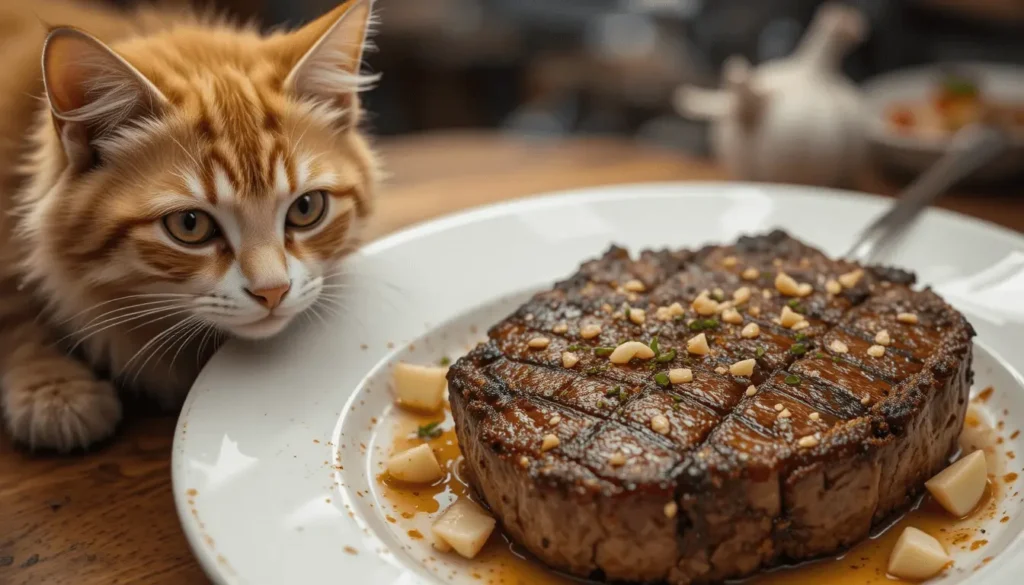
Seasoning and Additives: Silent Killers in Plain Sight
That delicious crust on your steak likely contains ingredients that are toxic to cats:
- Both garlic and onions contain thiosulfates, compounds that trigger oxidative damage to feline red blood cells, leading to potentially severe hemolytic anemia. Even small amounts over time can be dangerous.
- Salt – Excessive sodium leads to dehydration, kidney strain, and in severe cases, sodium ion poisoning.
- Butter and cooking oils contain concentrated fats that overwhelm a cat’s digestive system, potentially triggering acute pancreatitis – a severe inflammatory condition requiring immediate veterinary care
“A single garlic-heavy bite could send your cat to the emergency vet,” warns Dr. Sarah Wooten, DVM, in an interview with PetMD.
High Fat Content: A Recipe for Digestive Disaster
Not all steak cuts are created equal when it comes to feline safety:
| Steak Cut | Fat Content | Risk Level |
|---|---|---|
| Filet Mignon | Low | ✅ Safest option |
| Ribeye | High | ❌ Dangerous |
| T-Bone | Moderate | ⚠️ Caution needed |
The ASPCA reports that fatty foods cause 34% of diet-related feline pancreatitis cases. Symptoms to watch for:
- Lethargy
- Vomiting
- Loss of appetite
- Hunched posture (indicating abdominal pain)
Bone Hazards: More Dangerous Than You Think
Many cat owners don’t realize that steak bones pose dual threats:
- Choking Hazard – A single bone shard can wedge in your cat’s throat, cutting off airflow in seconds. This silent emergency often requires immediate veterinary intervention.
- Internal Trauma – Splintered bone fragments act like shrapnel, capable of:
- Intestinal perforations
- Mouth injuries
- Constipation from bone fragments
A 2022 study in the Journal of Feline Medicine and Surgery found that 17% of feline foreign body surgeries involved cooked bone fragments.
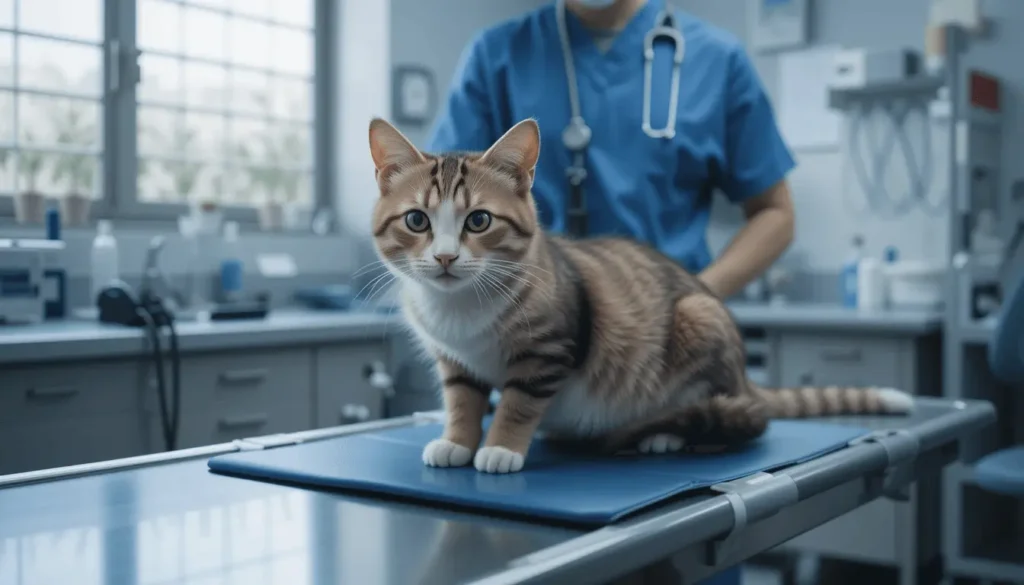
Safe Alternatives to Steak for Cats
If you want to treat your carnivorous companion without the risks, these vet-approved options provide all the meaty satisfaction without the dangers.
Cat-Safe Meat Options
When preparing meat for your cat:
- Best Choices:
- Plain boiled chicken (skinless)
- Lean ground beef (well-cooked, fat drained)
- Turkey breast (no seasoning)
- Preparation Tips:
- Always cook thoroughly to kill bacteria
- Cut into bite-sized pieces
- Never add oils or seasonings
Commercial Cat Food with High Protein
Modern commercial diets offer complete nutrition without guesswork:
- Wet Food Benefits:
- Higher moisture content supports urinary health
- Typically contains balanced taurine levels
- Easier to digest than human foods
- Top-Rated Brands:
- Hill’s Science Diet
- Royal Canin
- Purina Pro Plan
Homemade Cat Treats: A Healthier Choice
For pet owners who prefer DIY options, try these simple recipes:
Taurine-Rich Cat Treats
Ingredients:
- 1 cup cooked chicken liver
- 1 egg
- 1 tbsp catnip (optional)
Instructions:
- Blend ingredients until smooth
- Bake at 350°F for 15 minutes
- Cut into small cubes
Pro Tip: Consult your vet before making dietary changes, especially for cats with health conditions.
Conclusion
While steak might seem like a tempting treat for your carnivorous companion, the risks often outweigh the benefits. From toxic seasonings to dangerous bone fragments, what appears harmless to us can pose serious threats to feline health. By choosing safer alternatives like plain cooked chicken, high-quality commercial cat food, or vet-approved homemade treats, you can satisfy your cat’s cravings without compromising their wellbeing.
Remember: When it comes to your cat’s diet, it’s always better to be safe than sorry. So next time those pleading eyes beg for a bite of your steak, ask yourself: Is this momentary indulgence worth the potential vet visit?
Resources
- Safe Or Not ? Cat Food Guide
- ASPCA – Foods Toxic to Cats
- Cornell Feline Health Center – Feline Nutrition
- FDA – Pet Food Safety
FAQs
Can cats eat rare steak?
No. Rare steak carries the same risks as raw meat—potential bacteria like Salmonella and E. coli that can make your cat seriously ill. Always cook steak thoroughly if sharing with your cat.
How much steak can I safely give my cat?
If you choose to feed plain, cooked steak, limit it to 1-2 small, bite-sized pieces as an occasional treat—no more than once a week. It should never replace balanced cat food.
What should I do if my cat accidentally eats seasoned steak?
Watch for symptoms like vomiting, diarrhea, or lethargy. If the steak contained garlic, onions, or excessive salt, contact your vet or the ASPCA Animal Poison Control immediately at (888) 426-4435.
Are there any steak parts that are completely off-limits?
Yes! Never give your cat:
- Cooked bones (splinter hazard)
- Fat trimmings (pancreatitis risk)
- Marinated or processed meats (often contain toxic ingredients)

